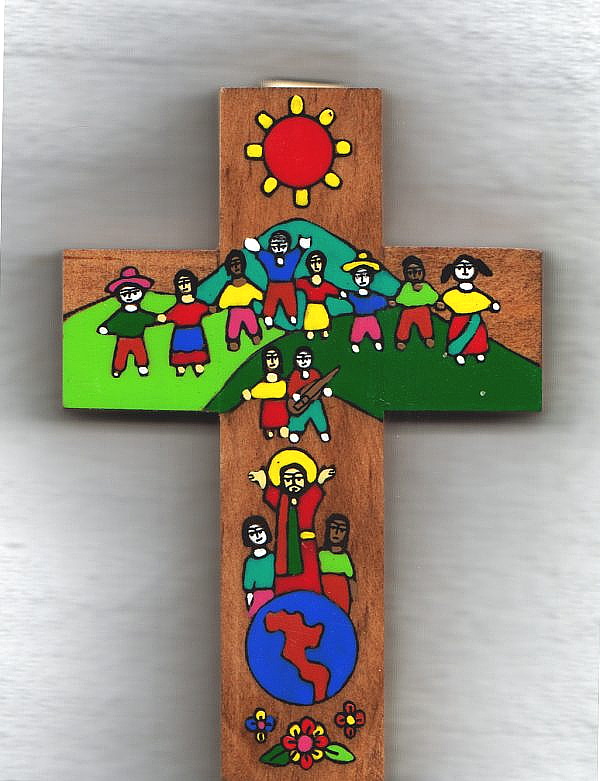The Free Trade Area of the Americas meets the Other Catholicism.
Published on TomPaine.com.
This week, trade ministers from throughout the hemisphere are meeting in Miami to conduct major negotiations for the Free Trade Area of Americas (FTAA). By now, the proponents of corporate globalization know to expect large crowds of union members, environmentalists, and human rights activists protesting outside their meetings. And they may not be surprised to hear critics categorize the FTAA as an effort to impose “neocolonialist” control over Latin American economies. The trade representatives may be less accustomed, however, to hearing that same charge coming from the Sunday pulpit.
They should get used to it.
This September, Catholic Bishops from Argentina, Brazil, Paraguay, Uruguay, Bolivia and Chile met to discuss the “ethical and moral” implications of the FTAA. In the end, they placed themselves squarely on the side of those in the streets. In their official statement, the Bishops warned that the FTAA “will foment the concentration of economic power in a few hands” and that it will curtail democratic sovereignty, “especially in the weakest countries in the Americas.”
Catholicism has received a lot of attention this fall, with the Vatican celebrating Pope John Paul II’s “silver anniversary” as head of the Church. While this press coverage has focused on the officialdom in Rome, the South American Bishops’ statement highlights a different religious current. Known as “liberation theology,” this other Catholicism has particular importance in the Americas, home of nearly half of the world’s 1.1 billion Catholics.
Liberation theology first emerged as a movement in Latin America in the late 1960s. A generation of Latino theologians, priests, and practitioners, encouraged by dramatic reforms taking place in Rome, looked at the reality of persistent and debilitating poverty in their region. In response, they criticized the Catholic Church’s cozy relationship with local elites. And they committed themselves to forming a religious practice that affirmed the dignity of the marginalized and excluded.
Theologically, their major documents—such as a statement produced at the 1968 Latin American Bishops’ Conference in Medellín, Colombia—argued that religious scripture called upon Christians to express this “preferential option for the poor.” In many countries ruled by dictators (typically sponsored by Washington), churchpeople became targets of death squads because of their refusal to keep quiet about human rights violations.
The other Catholicism faded from view after the Latin American “dirty wars” of the 1970s and 80s ended, and after conservative counter-currents within the Church contested the influence of “liberationist” priests. At the same time, many of liberation theology’s central ideas, including the preferential option for the poor, filtered into the mainstream of Catholic thought. Moreover, in a post-war era, religious progressives continued their human rights advocacy by taking stands on economic rights—such as the right to food and shelter—and by declaring the social impacts of economic neoliberalism contrary to the values of their faith.
In their recent analysis of the FTAA, the South American Bishops draw on the work of secular economists and sociologists. Such experts point to the fact that NAFTA, the agreement that trade boosters hope to expand through the hemisphere, led to the loss of 766,030 actual and potential US jobs between 1994 and 2000. Yet the flight of companies abroad hardly helped manufacturing workers in Mexico, who saw their real wages decline 21% in the same period, according to research by the Economic Policy Institute.
What makes religious voices unique, however, is the ethical view they bring to trade debates. Liberation theologians insist that the economy should be at the service of the humanity and respect the fundamental rights of peoples. They accuse those who place economic concerns above all else of practicing idolatry—of turning the market into a God—often with disastrous results for poor.
Pope John Paul II, who is far from a consistent ally of progressives on issues like abortion, has backed these economic criticisms. In his 1999 statement, Ecclesia in America, he warned that “more and more, in many countries of the Americas, a system known as ‘neo-liberalism’ prevails; based on a purely economic conception of man, this system considers profit and the law of the market as its only parameters.” John Paul II elsewhere argued that “the inalienable value of the human person must always be an end and not a means, a subject, not an object, not a commodity of trade,” and that globalization “must not be a new version of colonialism—It must respect the diversity of cultures which are life’s interpretive keys.”
Such moral considerations are generally hidden from view in trade negotiations that focus on arcane regulations and nationalist prerogatives. One reason that public protests are vital is that they place the ethical consequences of economic policy back on the table.
Whether or not the FTAA goes forward in Miami (and if the collapse of World Trade Organization talks in Cancún is any indication, it likely will not), the Bush Administration intends to use bilateral agreements to advance its economic goals. Religious progressives remind us that, whatever specific form the trade debate takes, we must judge economic policies based on their impact on the poor. They remind us that the struggle for a just political order is, at its core, a fight for human dignity — and a fight against the God of the Market.
__________
Research assistance for this article provided by Jason Rowe.
